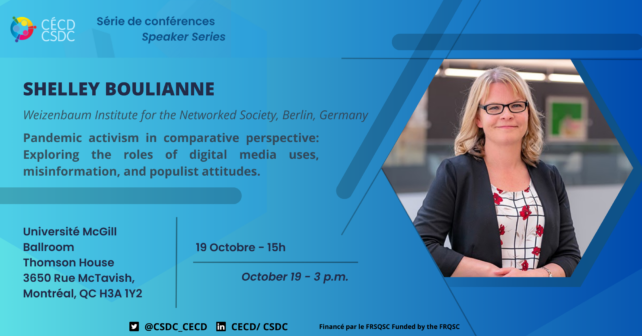
📍Université McGill, Ballroom, Thomson House, 3650 Rue McTavish, Montréal, QC, H3A 1Y2
🗓 : 19 Octobre 2023 @ 15h – 17h
Le Centre pour l’étude de la citoyenneté démocratique présente:
👤 Shelley Boulianne (Weizenbaum Institute for the Networked Society, Berlin, Germany)
Titre : Pandemic activism in comparative perspective: Exploring the roles of digital media uses, misinformation, and populist attitudes.
Populist discourse involves an anti-elite perspective which can undermine citizens’ trust in institutions. This discourse can be detrimental during crisis management, including the COVID-19 pandemic which required citizens to cooperate with public health measures. This paper examines the roles of populism, digital media, misinformation, and pandemic activism using two cross-national surveys. The first study was conducted in February 2021 in Canada, the UK, the US, and France. The second study was conducted in January and February 2023 in Germany, Canada, the UK, the US, and France. In both studies, I find that misinformation (exposure, sharing, and self-assessed ability to detect) is significantly and positively correlated with populist attitudes. In both studies, populist attitudes are weakly related to consuming online information directly from candidates and parties through their websites and social media accounts. In the second study, I extend the analysis further by examining the roles of misinformation, direct online information sources, and populist attitudes on citizens’ engagement in boycotts, buycotts, demonstrations, strikes, petitions, and contacting officials about pandemic-related policies such as masking, vaccination, and other public health measures. I find that misinformation (exposure, sharing, self-assessed ability to detect) is positively correlated with pandemic activism. I find a weak relationship between holding populist attitudes and participating in pandemic-related activism. In addition, I find that consuming direct online sources of information from candidates and parties is related to higher levels of participation in pandemic activism. Finally, I examine the extent to which these relationships replicate for both left and right-wing citizens as well as citizens in different countries. I conclude by discussing the implications of misinformed participation in terms of managing the pandemic and democracy. Further, while all political movements and parties frame issues to fit their agenda, there is something distinctive about the populist framing that undermines efforts to manage the pandemic and threatens representative democracy.
Tous les autres événements de notre Série de Conférences sont disponibles ici.
Cette série de conférences est financée par le Centre pour l¹étude de la Citoyenneté démocratique lui-même financé par le Fonds de recherche du Québec – Société et culture (FRQSC).
 English
English
